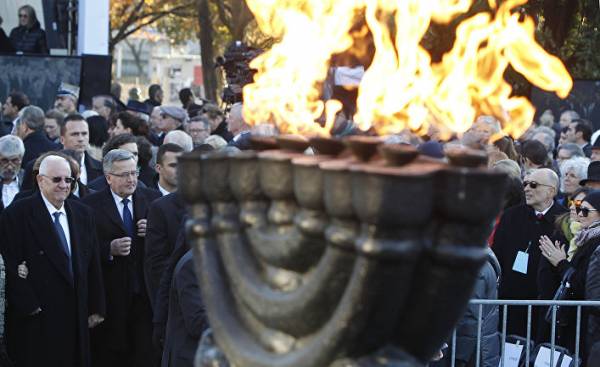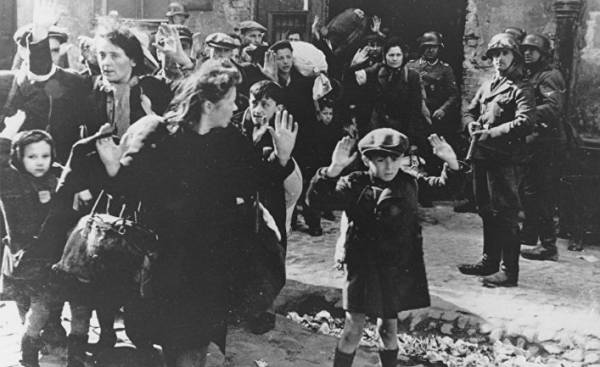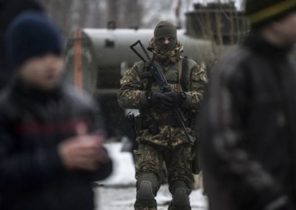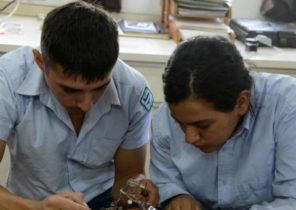
Games that write history: when world history gets a computer game, its a disgusting part of the wash. As, for example, the Holocaust. Our past becomes a militant, nationalist and heroic. What this might mean in light of the fact that these games become primary sources of historical descriptions of our time?
It is difficult to imagine that the pale facade of the office on Westlothian in Stockholm doing time travel. Manufacturer of computer games Paradox makes every effort to millions of players around the world could survive for many centuries past; the game industry was the main supplier of knowledge on the history.
But how the story, when she becomes a computer toy?
Several years ago I attended an international conference for producers of historical documentaries. The head of the delightful BBC History held a meeting under the name “talking Dead” (“The dead speak”), during which he outlined the problem of how these broadcasts forced the dead to speak. Historical computer games go even further. They are interactive and the players, so to speak, become dead, when they run past civilizations, attacking the Germans in Normandy or act for assassins in Florence since the Renaissance.
“Obviously, that is why and play our game,” says Pernille Sparholt (Pernilla Sparrhult), producer at Paradox.
Paradox is part of the phenomenon of Swedish computer games industry, along with companies such as King (which created a “Candy Crush”), Mojang (“Minecraft”) and Dice (“Battlefield”). If you count per capita, Sweden is the most successful producer in the world of computer games. A few weeks ago (may 5, 2017) newspaper Dagens Industri reported that “Income Paradox on the rise — stocks are rising”. Turnover increased by more than 30% and profit by 50 %.
One of the most successful projects Paradox — “Europa Universalis”, a series of strategic historical games.
“The player explores, what could be done differently in the story. We call it alternative history,” says Pernille Sparsholt.
Alternative history reminiscent of alternative facts, that is, lies. But academic historians use a similar concept: the counterfactual history. The Northern historian Ferguson (Niall Ferguson) in her research anthology “Virtual history: Alternatives and counterfeit” writes:
“What would have happened if Hitler had invaded the UK or the victory of the Soviet Union? What would have happened if the Russians won the cold war? Or if Kennedy had not died? The obvious objection is that such questions are meaningless. Why worry about what didn’t happen? Simple answer here — because in everyday life people are constantly asking counterfactual questions. What would happen if I didn’t drive too fast? Or if I refused the last glass of alcohol?”
Ferguson believes that counterfactual history has no scientific meaning, and pedagogical. It helps people better understand the past, placing it in easy-to-understand context of “what-would-be-if”. A growing body of research about computer games and history (I myself will take part in this with my future master’s thesis on how the way the second world war has changed in pop culture — including computer games). German historians Tobias Vingerling and Florian Kerschbaumer (Tobias Winnerling, Florian Kerschbaumer) who study the descriptions of the early modern computer games, write the story concerns not the past:
“History is clearly tied to the present. The story concerns what kind of memories we perceive as “past” and what they mean for us now.”
Maybe a flexible interpretation of history in computer games is just the logical consequence of this?
From Paradox to manufacturer of computer games, Dice, but the difference between the offices is striking. In Paradox to me as a visitor offered coffee or water, and the interview takes place in like a camera closet. Dice the visitor can choose from a variety of drinks, as game designer Martin Compared (Martin Kopparhed) takes in the conference room with a fantastic view. In Paradox I introduced his name to the list at the reception, and Dice needs to sign a contract of secrecy.
Martin Compared pondered the concept of “historically correct” and what it means in computer games:
“It is a clumsy concept, as all-pervading subjectivity. People look at history through the lens, and we, the creators of games can’t show everything. But we accept “historical correctness” as a benchmark, when, for example, trying to show the scale of history”.
Recently published scientific anthology about computer games and history, with a graceful name of “Playing with the past” (“Playing with the past”). Researchers extol the value of computer games in teaching history. The editors, Andrew Elliott and Matthew Wilhelm, Capell (B R Andrew Elliot, Matthew Wilhelm Kapell) write:
“Historical computer games allow deep to understand the facts, people and events. As well as present a complex discourse of uncertainty, conditions, and contingencies, which provide the basis for a genuine understanding of history.”
First and foremost, they mean that type of games, operated by Pernille Sparholt: relatively complex simulation of the course of world history from ancient times to the present. They are called, for example, “Civilization”, “Age of empires” and the game of Paradox’s “Europa universalis”. The story becomes a mixture of wars, Economics and high politics, where in the course of centuries determined the fate of States.
“I like to concentrate on trade and the economy, when I play “Europa universalis”,” — says Pernille Sparsholt. The game is quite neutral when it comes to controversial things.
Svenska Dagbladet: What does “contradictory things”?
Pernilla Sparholt: What, for example, to do with the slave trade. In our games we touch on very sensitive issues. We try to treat them with respect.
But as to the writing of history is affected by such treatment “contrary things”? We’ll come back to that.
Swedish academic research about computer games and history have recently attracted attention, when Adam Chapman (Adam Chapman) from the University of Gothenburg has published the monograph “the Computer game as a story” (“Digital Games as History”) by international publisher Routledge. Chapman writes about our mistaken view that modernity should be free from history. The facts say the opposite: I’ve never consumed so much history as it is now. This happens through pop culture, not least via computer games. But this kind of popular history is rejected within conventional educational debates, especially if it is served to visual images: television, movies and computer games. The written word is more valuable, says Chapman:
“The denial of popular history based not only on the idea of the superiority of the written word, but also on the idea of superiority of academic writing words.”
However, no longer are the days when the writings of academic historians played a major role in the transmission of historical knowledge. Their Golden age among the General public prevailed in the 19th and early 20th century, when historical science has been a political instrument of power, which was to give legitimacy to the then young nationalists, not least in Europe. History of the countries was equivalent to the history of “Nations”. But after 1945, conservative nationalism has suffered moral bankruptcy in connection with the fall of Nazi Germany. Thus historians were gradually expelled from the throne of the role in society that they had. They retreated back into the universities, where he remained — despite the fact that the conservative nationalist view of history and is experiencing a period of Renaissance. But this time, through popular history.
The problem with popular history is that she has a dual purpose: it not only has to convey information about the history, but also be economically profitable. A commercial product of “popular history” should therefore — to some extent — confirm the understanding of the history, which already have with consumers. Computer games are based on the fact that “is correct, or what he expects to see there,” writes Elliot-Chapels. In addition, historical games have to combine the facts with the playability, in the same way as a historical feature films combine facts with a good story (or narrative, as told to historian). The computer games should have working game mechanics that will provide positive experiences to the player. Otherwise the game will be harder to sell, no matter how historically correct it is.
“We can’t include in the game a historic event, if it is not will facilitate the implementation of game mechanics”, says Pernilla Sparsholt.
“But history offers us a structure that it is not necessary to invent. In the world there were systems, for example, political and economic, that we use in the game. On the other hand our game is very deep, but that’s what we wanted. We want to try to convey the complex system that existed in history.
Nowhere is the selective transmission of historical events does not become so obvious as in games about the second world war, where American troops regularly get the main role because Western buyers “know” that this was so, despite the fact that during the present second world war, the main battle was between the Soviet Union and Nazi Germany. (Mythologizing “D-Day” in 1944 as a watershed event in the war occurred only during the cold war in the 1960s). But to reflect this correct state of Affairs — thus risking to cause confusion of players and ultimately hurt the profits of producers of computer games. So American soldiers dominate and, being a result of what scientists call “selective authenticity”.
The Swedish company Dice was an international success with its series Battlefield, which was released 15 years ago, starting with “Battlefield 1942”, a game-shooter on world war II. Game designer Martin Copperhead confirms that historical computer games have a tendency to follow a given norm.
“Computer game often sends the story to be what she is expecting to see consumers,” he says. But it’s not all games. I think Dice can attract more attention if we show something that is not so well known. During world war II, we can depict the Eastern front instead of “D-Day” in Normandy, for example. The player will respond positively because he or she is this scenario had been seen not so often.
Last fall, Dice went their own way when they released the first game about the first world war “Battlefield I”. On the Western front the game features not only the usual stereotypical soldiers, the player can also be found with black soldiers from the American 369 th infantry regiment under the name “Hell fighters of Harlem” (“Harlem Hellfighters”).
“The first world war had almost never touched upon in video games, and the players didn’t know what to expect,” says Martin Compared.
“The players have no such clear idea about the battles of 1914 to 1918 as world war II. It was not an easy task. But we thought unexplored terrain can also generate interest, and wanted to show the enormity of the first world war. We all become teachers of history, when historical events are bringing to the public, lit it in the world. I’m a games producer responsibility”.
Dice quickly began to get racist reactions that involved black soldiers. The company was accused that she have changed history “political correctness” and thereby expressed his contempt for the white “European heroes who died during the first world war”, as someone expressed on the Internet forum (where he wrote and much worse things).
“But during the first world war between themselves fighting not only white people. When we make a story that is far from what some expected, they are quite sensitive. But I think it’s just a noisy minority,” says Martin Compared.
There are two answers to the question of “historical correctness” of a computer game. The first answer is simple and the second complex, but more interesting.
The vast majority of studies that are done when creating historical computer games for details. Devotees of the genre, the players who received the designation MÖP (“too interested in war”), carefully controlled to the correct version, for example, German machine guns, tanks of the British or American special forces were used in the correct time period computer games. Such details usually in historical computer games are respected very efficiently. They testify that the maker of computer games hires deeply interested in the history of employees, such as Pernilla Sparsholt.
But, it seems, few people in the computer games industry has an academic background in history. Pernilla Sparholt can’t offhand say which of her colleagues she studied at the University of humanitarian direction. Such education, of course, it would be wise in hiring, she says. But in General, according to Pernille Sparholt, historians “don’t know how to create computer games.” Which brings us to the second answer to the question about the historical accuracy.
Historian specializing in the middle ages, Adam Westlund (Adam Westlund) conducted a field study on the basis of the Paradox game “Europa Universalis”, which he appreciates for its high-level goals. Problems arise on a different plan, writes Westlund. The game starts from the national idea — but is it reasonable at all in the game, which takes place starting from the 15th century and beyond? Identifies the idea of “nation” is actually a modern phenomenon. According to the studies of nationalism, nation — modern fiction, which tends to present itself as an ancient primordial and self-evident truth. But computer games are usually long “reality” in which the story coincides with the struggle of Nations among themselves — that is, invented a past that wants to create a modern nationalism.
Westlund writes that “a nation is an essential element of “Europa Universalis”. Nation — the only actors of the game.” Therefore, these historical computer games are politicized, as a nation seem something given by God, according to Westerlund. “More different Nations and areas have their own specific culture,” he writes. Culture in video games — are essentially different, separate phenomena, placed in impermeable containers. In fact, on the contrary, cultures are always blurred lines. They mingled, lived together, evolved and influenced each other, working together, taking the exchange and trade. But in the world of computer games — as in the understanding of modern ultra-nationalism — intercultural meeting (“multiculturalism”), can be associated with problems.
Pernilla Sparholt tells how it works from the point of view of the mechanics of the game.
“If a player conquers an area where not too similar or completely different culture, with a new area will be difficult to handle. Easier there are conflicts. In our games it takes a lot of years until you manage to integrate the conquered province in our own culture. While that time has passed, of another nation there is time for recovery based on separatism.
Svenska Dagbladet: Why you need to pay the conquered province in “its own” culture?
Pernilla Sparholt: that is Because it was.
— No, I would say not always.
— You probably know more about it than I do. Well, of course, do not have to do. Our games can be played in many different ways. Many players, for example, refuse from the wars, and all concentrating on the trade and politics.
You can compare the essentialist view of culture in computer games with study the many empires that have taken place in history (most people who ever lived on earth in historical time, lived in a kind of empires). In the theory of empires “politics of diversity” — Central idea, that is transmitted to the software the work of Jane Burbank and Frederick Cooper (Jane Burbank and Frederick Cooper) “Empires in world history: power and the politics of diversity” (“Empires in world history: Power and the politics of difference”). The Roman Empire, a Muslim Kingdom and the Spanish Empire encompassed a huge cultural, religious and social ranges.
Another example is the Swedish Baltic Empire in 1561-1721. Some conquered by Sweden were integrated, while others retained their “legislation, authority, privileges, and thereby their own social structure,” writes Professor Klaus-Richard Behme (Klaus-Richard Böhme) in the anthology “In quest of trade and security: the Baltic in power politics”.
Westerlund says that the computer game “conveys a lot of causal relationships that correspond to academic research, but the overall picture gives a perspective very obsessed with colonialism, which represents the nation as absolutely the most important character in the historical period. This picture of the player, obviously, learn its historical consciousness.”
 © AP Photo Jews during the occupation of Warsaw by Germany
© AP Photo Jews during the occupation of Warsaw by Germany
That is, the historical computer game is politics.
So how do things stand with the controversial historic events in computer games? How Dice presented black soldiers on the Western front the first world war is one example. You can compare a computer game with feature-length films in cinema. They slowly evolved from simple entertainment to works, is able to challenge. Kinaesthetically war as a phenomenon has evolved from adaptations of adventure books for boys to much more complex phenomena (often with significant commercial success) on a white screen. Especially worthy of attention was paid to the Holocaust of 1941-1945. Pernilla Sparholt indicates how hard it is to include the Holocaust in a computer game.
“For us it is primarily concerned with respect. If the person playing Germany in our game in the second world war “Hearts of iron”, we remove the Holocaust. We don’t want to create a game in which the player is to kill Jews. But this raises difficulties in connection with the desire to convey the story properly. The closer in time we as creators of games suitable to the present, the greater the risk that someone of the players will have a personal connection with something that happens in the game. Then we pay more attention to how it will feel to the player than to make the game historically correct.
— Given the fact that computer games have become an important source of historical knowledge, do you see some problem that removed the controversial and painful moments?
— We try as possible to avoid the political component when it becomes too sensitive. But we are watching closely, as other mass-media appeal with difficult questions. We can learn from them. If something can be represented in the “Game of thrones”, so it is possible to affect the game.
Politicologie effects of lectures on the history taught in computer games to attract the consumer. But history is always used — no matter whether the past was presented as an awesome example or as a model. Only lucky peoples are free from history, a German proverb says. Tell me about your way of story, and I’ll tell you who you are. No matter whether found the history of computer form or not.







